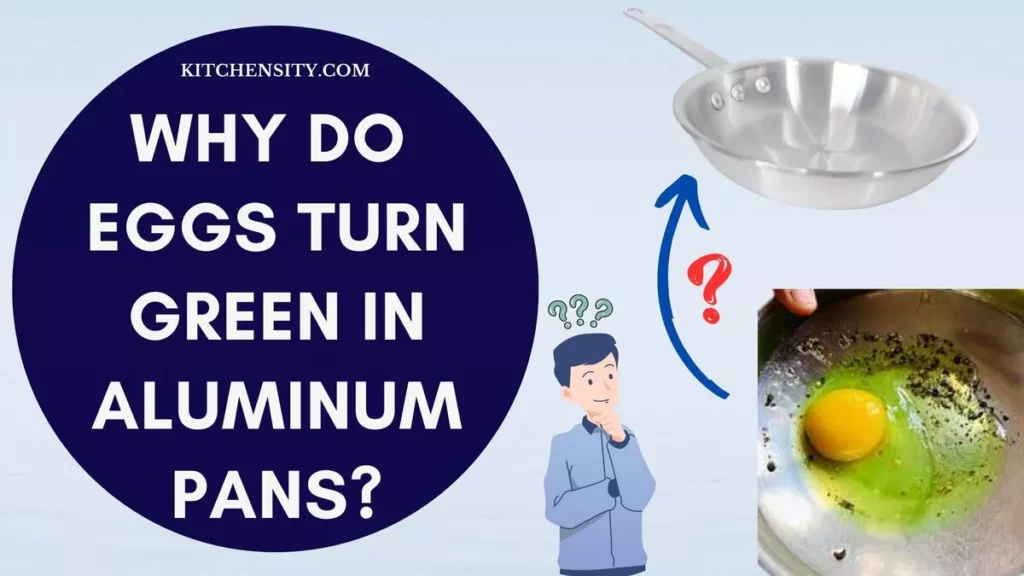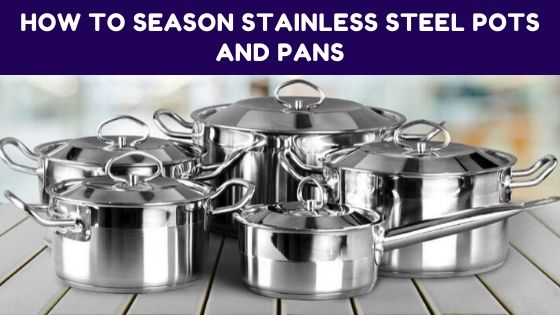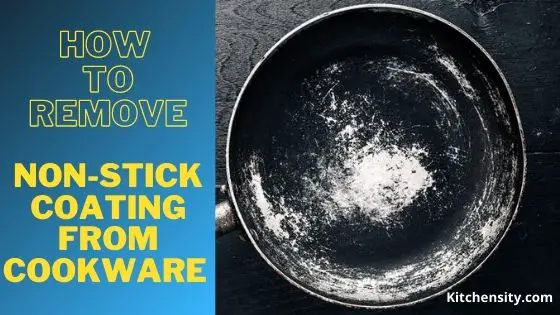When cooking eggs in aluminum pans, a peculiar and captivating phenomenon often occurs – a greenish color emerges on the egg’s surface. This intriguing color change is the result of a chemical reaction between the aluminum and the egg components.
As the eggs are exposed to the reactive metal, a fascinating process unfolds, leading to the formation of a green pigment known as ferrous sulfide.
While the sight of green eggs may be surprising, rest assured that it poses no harm and doesn’t compromise the taste or nutrition.
In this article, we will explore the science behind this captivating reaction, debunk common myths, and offer practical solutions to maintain the natural color of your eggs.

Table of Contents
- 1 Why Do Eggs Turn Green In Aluminum Pans?
- 2 Understanding The Chemical Reaction
- 3 Impact Of Temperature On The Reaction
- 4 pH Levels And Green Eggs
- 5 Factors Affecting The Reaction Of Greenish Of Eggs
- 6 How To Prevent The Eggs From Changing Color To Green?
- 7 Do Eggs React With Aluminum?
- 8 Is It Safe To Boil Eggs In Aluminum Pans?
- 9 Debunking Common Myths
- 10 Final Verdict
- 11 FAQs
Why Do Eggs Turn Green In Aluminum Pans?
Eggs turn green in aluminum pans due to a chemical reaction between the egg whites and the aluminum. When exposed to aluminum, a small amount of aluminum ions are released into the eggs, reacting with sulfur-containing compounds in the egg whites to form ferrous sulfide, which gives the eggs a greenish hue.
Also Read – Are Discolored Aluminum Pans Safe To Use?
Is It Safe To Eat?
Yes, green eggs are safe to eat. The green discoloration is a result of a chemical reaction between the egg whites and the aluminum pan, forming ferrous sulfide. While it may be surprising or off-putting, the color change does not indicate any safety concerns.
As long as the eggs are cooked properly, they remain perfectly safe and nutritious to consume.
Understanding The Chemical Reaction
Interaction With Aluminum
The green discoloration of eggs occurs due to a chemical reaction between the egg whites and the aluminum pan. When eggs come into contact with aluminum, a reaction takes place, resulting in the release of small amounts of aluminum ions into the food.
- The released aluminum ions then react with sulfur-containing compounds present in the egg whites.
- This reaction leads to the formation of ferrous sulfide, which is a greenish compound.
- As the egg cooks, this greenish compound becomes more noticeable, giving the eggs a green hue.
Understanding the interaction between aluminum and egg components is essential in comprehending why eggs turn green when cooked in aluminum pans.
Factors such as cooking temperature and pH levels can also influence the intensity of the color change.
Being aware of this chemical reaction allows us to take appropriate measures to prevent or minimize the green discoloration, ensuring our eggs look as appetizing as they taste.
Also Read – Do Aluminum Pans Work On Induction?
Formation Of Ferrous Sulfide
The green coloration of eggs cooked in aluminum pans is a result of the formation of ferrous sulfide. This chemical process occurs when the aluminum ions released from the pan come into contact with sulfur-containing compounds in the egg whites.
- As the aluminum ions react with the sulfur, they create ferrous sulfide, which is a greenish compound.
- The longer the eggs are cooked in the aluminum pan, the more prominent the green color becomes as the ferrous sulfide continues to develop.
Understanding the formation of ferrous sulfide is crucial in explaining why eggs turn green in aluminum pans. This chemical reaction is influenced by various factors such as cooking temperature, pH levels, cooking time, and the freshness of the eggs.
By being aware of these factors, we can take steps to control the color change and ensure our eggs remain visually appealing and enjoyable to eat.
Also Read – Ceramic Cookware Vs Aluminum Cookware
Impact Of Temperature On The Reaction
The temperature at which eggs are cooked plays a significant role in the intensity of the green coloration when using aluminum pans. Higher cooking temperatures can lead to a more pronounced green color change in the eggs.
- At elevated temperatures, the reaction between the aluminum ions and the sulfur-containing compounds in the egg whites becomes more vigorous.
- As a result, more ferrous sulfide, the greenish compound responsible for the color change, is formed during the cooking process.
Conversely, cooking eggs at lower temperatures can help reduce green discoloration.
By controlling the cooking temperature, you can influence the extent of the chemical reaction between aluminum and the egg components, ensuring your eggs maintain their natural color and appearance.
Being mindful of the impact of temperature on the reaction allows you to tailor your cooking method to achieve the desired results.
If you prefer eggs without the greenish tint, consider adjusting the cooking temperature accordingly to enjoy perfectly cooked, visually appealing eggs every time.
Also Read – Can You Put An Aluminum Pan In The Microwave?
pH Levels And Green Eggs
The pH level of the cooking environment also plays a crucial role in the color change of eggs cooked in aluminum pans. Eggs are slightly acidic, and acidic conditions can accelerate the reaction between aluminum and the sulfur-containing compounds in the egg whites.
- When the pH level is lower (more acidic), the reaction between the aluminum ions and the sulfur in the eggs is more rapid.
- As a result, more ferrous sulfide, the greenish compound responsible for the color change, is formed during the cooking process.
- This leads to a stronger green hue in the eggs.
On the other hand, if the pH level is higher (more alkaline), the reaction may proceed at a slower pace, resulting in a milder green coloration.
Controlling the pH level of the cooking environment is one way to manage the green discoloration of eggs.
By adding acidic ingredients like vinegar or lemon juice to the eggs before cooking, you can counteract the alkaline nature of the egg whites and reduce the likelihood of a pronounced green hue.
Also Read – How To Clean Oxidized Aluminum Pans?
Factors Affecting The Reaction Of Greenish Of Eggs
The green discoloration of eggs cooked in aluminum pans can be influenced by several factors. Understanding these factors can help you manage and control the color change to ensure your eggs look and taste their best.
- Cooking Time:
- The duration for which the eggs are cooked in the aluminum pan can significantly impact the intensity of the green color.
- The longer the eggs are exposed to the aluminum, the more time there is for the reaction between the aluminum ions and the sulfur-containing compounds in the egg whites to occur.
- Consequently, longer cooking times can lead to a more pronounced green hue.
- Egg’s Freshness:
- The freshness of the eggs also plays a role in the green discoloration.
- Fresh eggs have a different pH level compared to older eggs.
- As eggs age, their pH levels can change, making them more susceptible to the reaction with aluminum and the subsequent green color change.
- Using fresher eggs may help reduce the likelihood of excessive green discoloration.
- pH Levels:
- As mentioned earlier, the pH level of the cooking environment affects the reaction between aluminum and egg whites.
- Acidic conditions can accelerate the reaction, leading to a stronger green coloration, while more alkaline conditions may result in a milder color change.
- Cooking Temperature:
- The cooking temperature is another critical factor affecting the color change in eggs.
- Higher temperatures can promote a more vigorous reaction between aluminum and the egg components, leading to a deeper green hue.
- Lowering the cooking temperature can help minimize color change.
- Non-Aluminum Cookware:
- Using non-aluminum cookware, such as stainless steel or non-stick pans, is an effective way to prevent green eggs altogether.
- By avoiding aluminum pans, you eliminate the opportunity for the aluminum ions to react with the egg whites and form ferrous sulfide.
Also Read – Can You Put Aluminum Foil In The Oven?
How To Prevent The Eggs From Changing Color To Green?
The green discoloration of eggs cooked in aluminum pans can be prevented or minimized by taking some simple yet effective measures. By being proactive, you can enjoy perfectly cooked eggs without any unwanted green hue. Here are some ways to prevent the reaction:
- Use Non-Aluminum Cookware:
- The most straightforward method to prevent green eggs is to use non-aluminum cookware.
- Opt for stainless steel, cast iron, or non-stick pans instead.
- These materials do not react with the egg whites and eliminate the possibility of forming ferrous sulfide, the greenish compound responsible for the color change.
- Add Acidic Ingredients:
- If you prefer using aluminum pans or have limited cookware options, you can minimize the reaction by adding acidic ingredients to the eggs before cooking.
- A splash of vinegar or a squeeze of lemon juice can help counteract the alkaline nature of the egg whites, reducing the likelihood of a strong green color.
- Control Cooking Time And Temperature:
- Be mindful of the cooking time and temperature when preparing eggs in aluminum pans.
- Shorter cooking times and lower temperatures can help lessen the intensity of the reaction between aluminum and egg whites, resulting in a milder color change.
- Use Fresh Eggs:
- Opt for fresh eggs when cooking in aluminum pans.
- Fresher eggs have a more balanced pH level, which makes them less prone to color-changing reactions with aluminum.
- By using fresh eggs, you can reduce the risk of getting overly green eggs.
- Experiment With Ph Levels:
- If you enjoy culinary experimentation, you can explore different acidic ingredients and their quantities to adjust the pH level of the egg whites.
- This can allow you to achieve the desired coloration while still using aluminum pans.
- Avoid Overcooking:
- Avoid overcooking the eggs, as extended exposure to the aluminum pan can lead to more significant color changes.
- Cook the eggs to the desired level of doneness and promptly remove them from the heat to retain their natural color.
Also Read – Can You Put A Roasting Pan On The Grill?
Do Eggs React With Aluminum?
Yes, eggs do react with aluminum. When eggs come into contact with aluminum, a chemical reaction occurs, leading to the release of small amounts of aluminum ions into the food. These aluminum ions then react with the sulfur-containing compounds present in the egg whites.
The result of this reaction is the formation of ferrous sulfide, which is a greenish compound. As the egg cooks, the greenish color becomes more visible, giving the eggs a green hue.
It’s important to note that this reaction is a natural occurrence and does not pose any health risks. While some people may find the green coloration surprising or off-putting, it does not affect the safety or nutritional value of the eggs.
The reaction is more pronounced when eggs are cooked in aluminum pans, which is why using non-aluminum cookware or adding acidic ingredients to the eggs can help minimize the green discoloration.
Also Read – Can You Deep Fry In A Non-Stick Pan?
Is It Safe To Boil Eggs In Aluminum Pans?
Boiling eggs in aluminum pans is generally considered safe. The green discoloration that can occur when eggs are cooked in aluminum pans is a result of a chemical reaction between the aluminum and the egg whites, which forms ferrous sulfide, a harmless compound.
While the green color might be unexpected or unappealing to some, it does not indicate any safety concerns. As long as the eggs are cooked properly, following standard cooking guidelines, they are safe to eat.
However, if you prefer to avoid green discoloration altogether, you can opt for non-aluminum cookware, such as stainless steel or non-stick pans. Using non-aluminum pans eliminates the possibility of a chemical reaction and ensures your eggs retain their natural color.
Ultimately, the decision to boil eggs in aluminum pans depends on your personal preference and cooking practices.
If you enjoy using aluminum cookware and don’t mind the occasional greenish tint, there is no safety issue with boiling eggs in aluminum pans.
Also Read – Does Induction-Ready Mean Oven-Safe?
Debunking Common Myths
When it comes to the green discoloration of eggs in aluminum pans, several myths and misconceptions are circulating. Let’s debunk some of these common myths to set the record straight:
1. Myth: Green Eggs Are Unsafe To Eat
Fact: Contrary to popular belief, green eggs are safe to eat. The green coloration is a result of a chemical reaction between the aluminum and the egg whites, forming ferrous sulfide.
However, this reaction does not make the eggs harmful or toxic. As long as the eggs are cooked properly and handled safely, they are perfectly safe to consume.
2. Myth: Green Eggs Are Spoiled
Fact: The green color of eggs has nothing to do with their freshness or spoilage. It is purely a chemical reaction that occurs when eggs are cooked in aluminum pans. Fresh eggs are just as likely to turn green as older eggs when exposed to aluminum.
Also Read – Is Stainless Steel Safe For Cooking?
3. Myth: Green Eggs Lack Nutritional Value
Fact: The green coloration has no impact on the nutritional value of the eggs. Eggs remain a rich source of protein, vitamins, and minerals, regardless of their color. Green eggs are as nutritious as their regular counterparts.
4. Myth: Green Eggs Taste Different
Fact: The green color does not alter the taste of the eggs. The flavor of green eggs is identical to that of regular eggs. Any difference in taste is likely due to the cooking method or additional ingredients used, not the color change.
5. Myth: Green Eggs Are Unappetizing
Fact: While the green color might appear unusual to some, it is not an indication of bad taste or quality. The perception of green eggs being unappetizing is subjective. Many people find green eggs visually appealing and enjoy them just as much as regular eggs.
6. Myth: Green Eggs Are Undercooked
Fact: The green discoloration does not signify undercooked eggs. The color change is a result of the reaction with aluminum, and it can occur even if the eggs are fully cooked.
Always rely on proper cooking techniques and internal temperature to determine if eggs are adequately cooked.
Also Read – Are Gotham Steel Pans Oven-Safe?
Final Verdict
So, the green discoloration of eggs cooked in aluminum pans is a result of a chemical reaction between the aluminum and sulfur-containing compounds in the egg whites.
The intensity of the green color can be influenced by factors like cooking temperature, pH levels, cooking time, and the freshness of the eggs.
The interaction between the egg components and the reactive aluminum gives rise to the formation of ferrous sulfide, resulting in distinct green coloration.
While this transformation might surprise some, it is essential to remember that green eggs remain safe to eat and retain their nutritional value.
By understanding the factors influencing the reaction and implementing preventive measures, such as using non-aluminum cookware or adjusting pH levels, you can control the color change and enjoy perfectly cooked eggs without any unwanted surprises.
So, the next time you cook eggs in an aluminum pan, relish the magic of this chemical dance and savor the delight of an extraordinary culinary experience.
Also Read – Are Calphalon Pans Oven-Safe?
FAQs
-
Is It Safe To Eat Eggs That Turn Green In Aluminum Pans?
Yes, the green coloration does not affect the safety of the eggs. They are safe to eat as long as they are cooked properly.
-
How Can I Prevent Eggs From Turning Green In Aluminum Pans?
You can use non-aluminum cookware or add acidic ingredients like vinegar or lemon juice to the eggs before cooking.
-
Does The Green Color Change The Taste Of The Eggs?
No, the green color does not alter the taste of the eggs. They will taste the same as regular eggs.
-
Are Fresh Eggs Less Likely To Turn Green?
Yes, fresh eggs are less likely to turn green compared to older eggs due to differences in pH levels.
-
Can I Still Use Aluminum Pans For Cooking Eggs?
Yes, you can use aluminum pans for cooking eggs. If you want to avoid green eggs, adjust the cooking conditions or use non-aluminum cookware.
Katrina Smith is a seasoned expert with over 25 years of experience in all things related to cooking and the kitchen. As an avid cook and kitchen enthusiast, she is passionate about sharing her knowledge and expertise on cookware, kitchen appliances, kitchen tips, and kitchen staples.
Through her articles and reviews, Katrina aims to inspire and help others improve their cooking skills, experiment with different ingredients, and invest in quality cookware and appliances.

![How To Season And Clean Cast Iron Cookware? [4 Effective Ways] 3 How To Season And Clean Cast Iron Cookware](https://www.kitchensity.com/wp-content/uploads/2020/06/How-To-Season-And-Clean-Cast-Iron-Cookware.jpg)

![Stainless Steel Vs Nonstick Vs Ceramic Cookware Set [An Ultimate Guide 2023] 5 Stainless Steel vs Nonstick vs Ceramic Cookware Set](https://www.kitchensity.com/wp-content/uploads/2019/09/Stainless-Steel-vs-Ceramic-vs-Nonstick-Cookware-Sets-e1621083482728.jpg)

![What Pans Can You Use Cooking Spray On? [Ultimate Guide] 7 Types of pans with which cooking spray can be used](https://www.kitchensity.com/wp-content/uploads/2023/02/What-Pans-Can-You-Use-Cooking-Spray-On.jpg)
